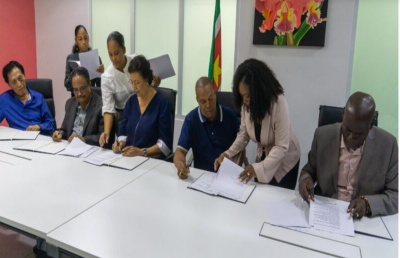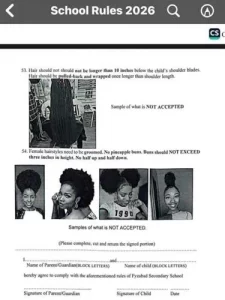Caption: Representatives of five political parties sign the latest coalition agreement on Monday night. Photo: CMC
PARAMARIBO– Five political parties Monday night signed a coalition agreement as Suriname moves towards the formation of a new government in the Dutch-speaking Caribbean Community (CARICOM) country.
However, there are conflicting reports as to whether the General Liberation and Development Party (ABOP), led by Vice President Ronnie Brunswijk, has signed the accord that followed five hours of talks on Monday.
“ABOP has reserved its options. The other parties will continue,” said Jennifer Geerlings-Simons, the chair of the National Democratic Party (NDP) and who has been put forward as the presidential candidate to replace outgoing head of state, Chandrikapersad Santokhi.
She said that if Brunswijk still wants to sign, he will be allowed to do so, adding “in any case, we will continue together. We have discussed the main points and the special programme and have reached an agreement on them.”
Last month, the six opposition parties, which together won 34 of the 51 seats in the National Assembly, signed an agreement in principle for the formation of a coalition government. The NDP has signed an agreement with five minority parties including the Alternative 2020 Party (A20), the Brotherhood and Unity in Politics party (BEP), ABOP, the National Party of Suriname (NPS), and the Pertjajah Luhur Party (PL).
Media reports here said that during the meeting on Monday, Brunswijk did not express any reservations and it had been decided to reprint the coalition agreement and have it signed by the other five parties.
“I am not going to make a statement about that. Let him say it himself. He was completely in agreement with the programme, The NDP chair told reporters with regards to Brunswijk and ABOP’s participation.
The coalition agreement is titled “Together on the road to a socially just and prosperous society,” and outlines the areas of cooperation between the political parties.
The coalition said it intends to achieve tangible results within this five-year term of office and that it will seek to establish a solid economic basis by, among other things, rationalising state expenditure and increasing the state’s earning capacity.
If ABOP does not agree to participate in the coalition it could miss out on four ministerial posts as well as the vice-chairmanship of the National Assembly.
Last week, the Independent Electoral Bureau (OKB)declared that the parliamentary elections held on May 25 were valid, after the Central Main Electoral Office (CHS) had earlier announced the election results during a public sessio.
The elections were held for the first time under a system of proportional representation, which necessitates the formation of coalitions.
The Progressive Reform Party ( VHP), headed President Santokhi, says it will explore the legal options to also nominate candidates for the upcoming elections for the leadership of the National Assembly, as well as for the offices of President and Vice President.
According to the law, seven members of parliament may jointly nominate a presidential candidate. The VHP says it is considering doing just that.
It is expected that the new parliament will hold a session on July 8 to elect the new government leader and If, after two rounds of voting in parliament, no president is elected, the process will move to the United People’s Assembly, which includes members of parliament, regional councils, and district councils.
![]()













